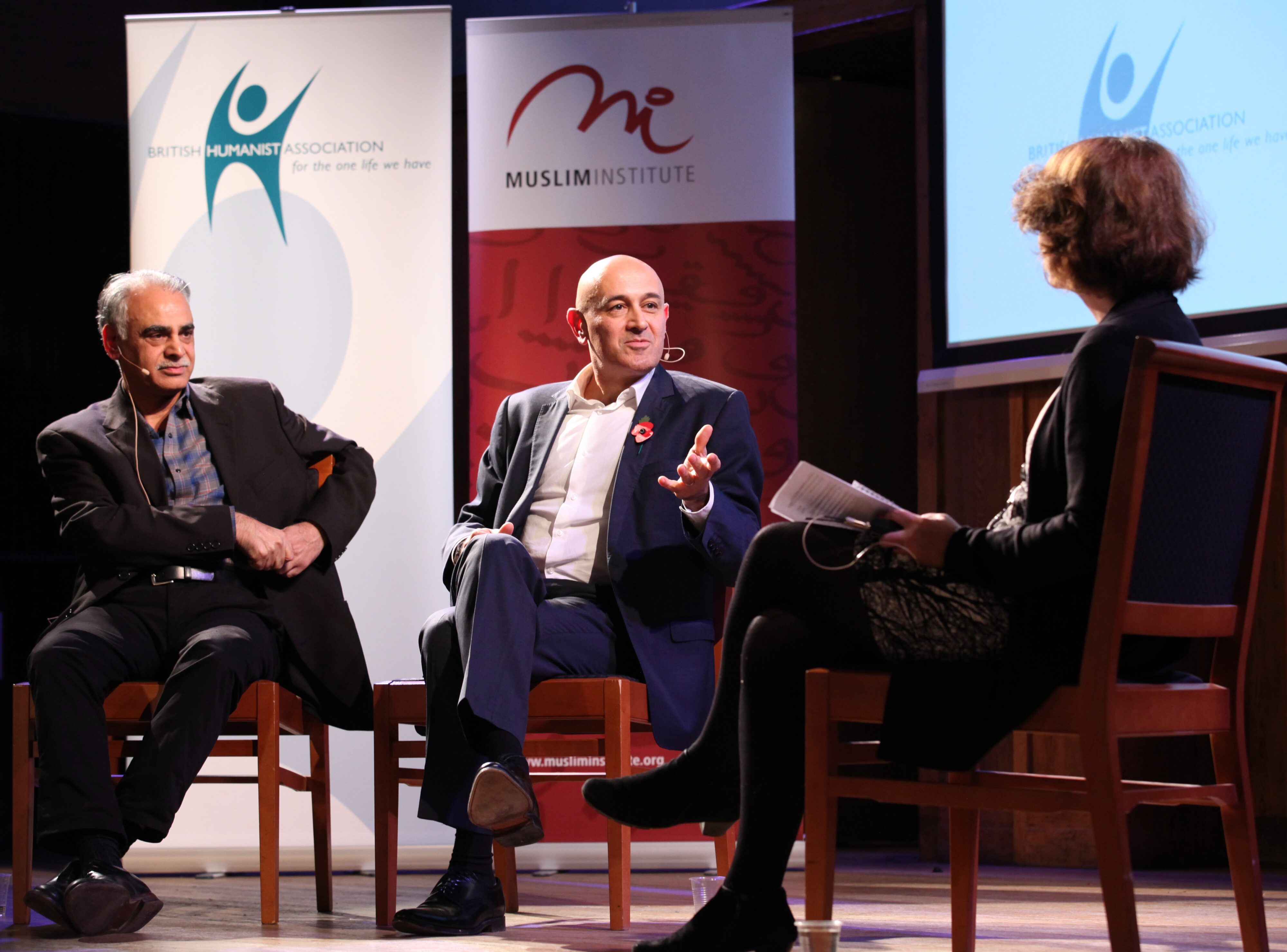
Ziauddin Sardar and Jim Al-Khalili in Conversation, Conway Hall, London October 2015
The Muslim Institute, a registered charity, is a Fellowship society of thinkers, academics, artists, students, creatives, professionals and all those interested in thinking and learning. It aims to promote and support the growth of thought, knowledge, research, creativity and open debate within the Muslim community and wider society. The Institute emphasises the diversity and plurality of Islam and Muslims to promote dialogue, cooperation and collaboration between Muslims and other cultures and within Muslim communities.

Lord Bhiku Parekh giving the Fifth Annual Ibn Rushd Lecture, Arts Workers Guild, London, May 2017
The Institute draws its inspiration from the critical thought and lively debates of Islamic history. In the classical age of Muslim civilization, libraries and institutions of research and learning abounded. The great cities across the Muslim World had universities, observatories, Houses of Wisdom. From this context emerged the learned societies, generally referred to as futawwah, or knowledgeable clubs. Initially they were devoted to promoting a virtuous life based on knowledge, humility, magnanimity, hospitality, social work, and the service of humanity amongst young men. Some futawwah organisations evolved into guilds devoted to promoting a particular profession or discipline, such as book binding or surgery, others became dedicated entirely to sports, still others promoted philosophy or astronomy, mathematics and other branches of natural sciences. Despite their variety, all emphasised thought, learning and the pursuit of excellence as key Islamic ideals. Members emphasised mutual loyalty, met frequently to discuss relevant issues and eat, and prided themselves on their ethical standards. While membership was based on certain criteria, it was open to people of all classes, including non-Muslims. And memberships of futawwah societies were eagerly sought – even caliphs had to apply, although not all rulers were granted memberships!

A group of Ottoman scholars and jurists gather for dinner and discussion in their futawwah club. From Huseyin Vehbi, Surnami-e-Vehbi, early sixteenth century.
The Muslim Institute has a history going back to 1973. Its original title was the Muslim Institute for Research and Planning and its aim was to promote thought and long-range planning on the problems of the Muslim societies. A Preparatory Committee issued a Draft Prospectus in 1974 arguing that ‘there is an urgent need to revive a tradition of Muslim scholarship to produce a philosophical framework which is at least as articulate and rationally satisfying as all the other traditions of knowledge that are current today’. The Prospectus also argued that ‘a prior commitment to the epistemology of Islam (or framework of knowledge) is a necessary starting point in the search for alternative social, economic and political systems for Muslim societies’.
During this early phase the Muslim Institute published ground breaking work on science policy, economic development, social change, and the future of Muslim civilisation.
However, things changed dramatically after the Iranian revolution. The then Director, Dr Kalim Siddiqui, became a strong supporter of the Iranian revolution, leading to a spilt in the Institute. Many founding members, including Ziauddin Sardar, left the Institute.
After the death of Kalim Siddiqui in 1996, Dr Ghayasuddin Siddiqui, who was involved with the Institute from its early days, became the Director and re-established the Institute as an independent organisation. But the Institute became entangled in a bitter dispute, over its independence and direction, between some of the trustees and the family of Kalim Siddiqui – a dispute that involved court cases and lasted almost a decade. The dispute was finally settled in 2008.
The Institute established a number of important organisations that have played a significant part in shaping the British Muslim community – such as the Muslim Parliament of Great Britain, The Halal Food Authority, and Bait al-Mal al-Islami, which raised funds to supported young Muslim scholars and students. The Institute also worked to highlight problems within the Muslim community such as forced marriages, domestic violence, honour killings and child abuse, and produced a Muslim Marriage Contract that gave equal rights to both partners and a Guideline Report on Child Protection in Faith Based Environments to safeguard children attending mosque-based schools. It even organised guided tours to ‘Islamic Britain’ with visits to London’s Guildhall, Leighton’s Arab Hall, Burton’s Mausoleum, Shah Jehan Mosque, Abdullah Quilliam Mosque and other sites.
During the 2000s the Institute began organising a series of brainstorming sessions with academics and activists on key issues facing Islam and Muslims. Shortly afterwards, Dr Ghayasuddin Siddiqui approached Professor Ziauddin Sardar to help relaunch the Muslim Institute. A Planning Conference was organised at Sarum College, Salisbury, to debate how the Institute should move forward. It was held in December 2009. In his opening speech Dr Ghayasuddin Siddiqui emphasised that we should look towards the future but learn, and re-learn, some of the lessons of the Institute’s history. After three days of debate and discussion, it was determined that the Institute would be a network devoted to pluralistic thought, creativity, excellence and high achievement; and a community of Fellows dedicated to ideas and debate that places diverse, argued, and considered positions in the public space.
The Muslim Institute was reshaped and re-launched in 2010 to revitalise the critical, intellectual and creative capacity of British Muslims by rekindling the distinguished but much neglected tradition of futawwah circles of learning.
In December 2023, the Muslim Institute organised a 50th anniversary to mark this historic milestone at its annual Winter Gathering in Salisbury. Many of the speakers during the weekend residential were there at the start of the Institute’s journey in 1973 and had flown in from the Middle East, North America and Africa. They were joined with key activists who had built Muslim political, social and community organisations in the UK across the decades. Also taking part was Bosnia’s Grand Mufti Emeritus Mustafa Cerić.